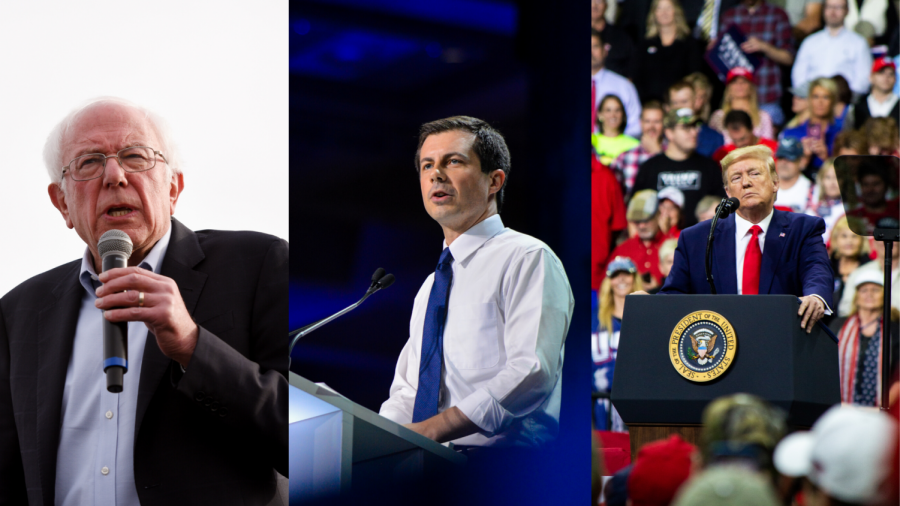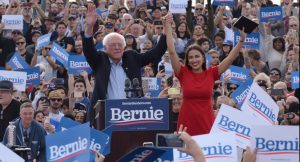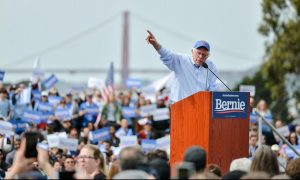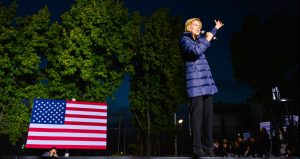After night of chaos, Buttigieg, Sanders, Trump score wins at Iowa caucuses
Kathy Fang and Nikolas Liepins, with the NSPA Campaign 2020 Photo Exchange project
From left to right: Democratic presidential candidates Sen. Bernie Sanders (I-Vt.) and former South Bend Mayor Pete Buttigieg, and Republican presidential candidate President Donald Trump
February 4, 2020
After a 21-hour delay due to inconsistencies in voting results, the Iowa Democratic Party’s caucus results indicate that Democratic presidential candidates former South Bend Mayor Pete Buttigieg and Sen. Bernie Sanders (I-Vt.) are currently leading the race, with 62 percent of precincts reporting.
President Donald J. Trump led the Republican Iowa caucuses with over 97 percent of the votes, which were reported yesterday evening. Other Republican contenders former Massachusetts Gov. William Weld and former Illinois Rep. Joe Walsh garnered 1.31 percent and 1.08 percent of the vote respectively.
Both parties’ caucuses began at 7 p.m. CST yesterday, but Democratic party officials reported that the results had been delayed due to “inconsistencies” in their reporting, according to a press statement released today. Iowa Democratic Party Communications Director Mandy McClure stated that the results from the new voting app used did not correlate with the paper data that was also recorded.
Shadow, Inc. the non-partisan, for-profit technology firm that was contracted by the Iowa Democratic Party to build a caucus reporting mobile app, has since apologized for the coding issues within the app and stated a commitment to improve the system.
“We will apply the lessons learned in the future, and have already corrected the underlying technology issue,” the company tweeted today. “We take these issues very seriously, and are committed to improving and evolving to support the Democratic Party’s goal of modernizing its election processes.”
At the caucus, state delegate equivalents (SDEs) are awarded in proportion to the number of votes each candidate receives, and SDEs determine the number of national delegates each candidate receives. Buttigieg is currently leading the caucus vote and received about 363 SDEs. Sanders follows, with about 338 SDEs.
Democratic frontrunners Joe Biden and Elizabeth Warren fell behind, with 210 and 246 SDEs, respectively.
The 41 Iowan national delegates have not yet finished declaring their pledges. Democratic candidates need to receive at least 1,990 national delegates to become the Democratic party’s presidential nominee.
Democratic caucus results were posted at 4 p.m. CST, after most of the candidates had already left to campaign in New Hampshire.
The next round of primaries will be held in New Hampshire on Feb. 11.
Though the delay prevented the leading candidates from delivering victory speeches in Iowa, Buttigieg delivered a speech at around 11 p.m. CST last night that foreshadowed his success.
“Tonight, an improbable hope became an undeniable reality,” he said last night. “So we don’t know all the results, but we know by the time it’s all said and done, Iowa, you have shocked the nation because by all indications, we are going on to New Hampshire victorious.”
Sanders, who is currently campaigning in New Hampshire, has not yet officially responded to the Iowa caucus results. His senior advisor, Jeff Weaver, issued a statement, thanking the people of Iowa.
“In the partial data released so far it’s clear that in the first and second round more people voted for Bernie than any other candidate in the field,” Weaver’s statement read.
This morning, Trump tweeted his reaction to both parties’ caucuses, claiming that “The Democrat Party in Iowa really messed up, but the Republican Party did not. I had the largest re-election vote in the history of that great state, by far, beating President Obama’s previous record by a lot.”
Caucuses are conducted based on in-person turnout. Caucusgoers vote by standing in different sections of a room that are devoted to specific presidential candidates. Each caucusgoer is also given a paper presidential preference card to fill out and submit.
After the first round of votes, candidates who gathered less than 15 percent of the votes are deemed non-viable and subsequently will not receive any delegates. Their caucus supporters are given the chance to either realign with a viable group, raise support for their non-viable group or choose to be uncommitted.
At the end of the night, a number of national delegates depending on state size are divided amongst the leading candidates in proportion to the votes they receive.
Iowa Democratic Party officials also stated that the delay in results was due to new party rules requiring caucus leaders to report three sets of numbers to party headquarters rather than just the delegate totals.
The new rules come after the extremely tight race between Sanders and former Secretary of State Hillary Clinton in 2016, after which The Des Moines Register urged the Democratic National Committee to require caucuses to track the exact numbers of how many people supported each candidate.
This year, the Iowa Democratic Party revised its caucus rules to allow early check-in and to facilitate data collection. According to a statement released by Nevada State Democratic Party chair William McCurdy II, Nevada will not be using the same voting app Iowa used for their caucus on Feb. 22.
For the first time, satellite caucuses for Iowans were held across the country and in three locations abroad: Paris; Glasgow, Scotland and Tbilisi, Georgia.
In response to the voting app delay, Democratic presidential candidate Michael Bloomberg, who missed the filing deadline for the Iowa caucus, authorized his campaign to double his spending on television commercials and to increase his campaign staff to more than 2,000 people.
Other Democratic presidential candidates have filled their schedules with campaign events in New Hampshire.
California will hold its state primary along with 13 other states and American Samoa on March 3, also known as Super Tuesday. These states will be awarded about 40 percent of all pledged Democratic delegates.
Democratic candidates still in the race include Sen. Michael Bennet, Biden, Bloomberg, Buttigieg, Rep. Tulsi Gabbard, Sen. Amy Klobuchar, former Massachusetts governor Deval Patrick, Sanders, Tom Steyer, Warren and Andrew Yang.
Republican candidates still in the race include Trump, Weld and Walsh.




![LALC Vice President of External Affairs Raeanne Li (11) explains the International Phonetic Alphabet to attendees. "We decided to have more fun topics this year instead of just talking about the same things every year so our older members can also [enjoy],” Raeanne said.](https://harkeraquila.com/wp-content/uploads/2025/10/DSC_4627-1200x795.jpg)


















![“[Building nerf blasters] became this outlet of creativity for me that hasn't been matched by anything else. The process [of] making a build complete to your desire is such a painstakingly difficult process, but I've had to learn from [the skills needed from] soldering to proper painting. There's so many different options for everything, if you think about it, it exists. The best part is [that] if it doesn't exist, you can build it yourself," Ishaan Parate said.](https://harkeraquila.com/wp-content/uploads/2022/08/DSC_8149-900x604.jpg)




![“When I came into high school, I was ready to be a follower. But DECA was a game changer for me. It helped me overcome my fear of public speaking, and it's played such a major role in who I've become today. To be able to successfully lead a chapter of 150 students, an officer team and be one of the upperclassmen I once really admired is something I'm [really] proud of,” Anvitha Tummala ('21) said.](https://harkeraquila.com/wp-content/uploads/2021/07/Screen-Shot-2021-07-25-at-9.50.05-AM-900x594.png)







![“I think getting up in the morning and having a sense of purpose [is exciting]. I think without a certain amount of drive, life is kind of obsolete and mundane, and I think having that every single day is what makes each day unique and kind of makes life exciting,” Neymika Jain (12) said.](https://harkeraquila.com/wp-content/uploads/2017/06/Screen-Shot-2017-06-03-at-4.54.16-PM.png)








![“My slogan is ‘slow feet, don’t eat, and I’m hungry.’ You need to run fast to get where you are–you aren't going to get those championships if you aren't fast,” Angel Cervantes (12) said. “I want to do well in school on my tests and in track and win championships for my team. I live by that, [and] I can do that anywhere: in the classroom or on the field.”](https://harkeraquila.com/wp-content/uploads/2018/06/DSC5146-900x601.jpg)
![“[Volleyball has] taught me how to fall correctly, and another thing it taught is that you don’t have to be the best at something to be good at it. If you just hit the ball in a smart way, then it still scores points and you’re good at it. You could be a background player and still make a much bigger impact on the team than you would think,” Anya Gert (’20) said.](https://harkeraquila.com/wp-content/uploads/2020/06/AnnaGert_JinTuan_HoHPhotoEdited-600x900.jpeg)

![“I'm not nearly there yet, but [my confidence has] definitely been getting better since I was pretty shy and timid coming into Harker my freshman year. I know that there's a lot of people that are really confident in what they do, and I really admire them. Everyone's so driven and that has really pushed me to kind of try to find my own place in high school and be more confident,” Alyssa Huang (’20) said.](https://harkeraquila.com/wp-content/uploads/2020/06/AlyssaHuang_EmilyChen_HoHPhoto-900x749.jpeg)
















